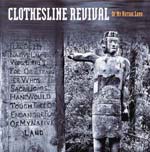

Clothesline Revival
Of My Native Land
(Paleo Music)
Back in the day, Moby made an album called Play, and that album sounded innovative to me. I got the album the day it came out, reviewed it just over a week later, and subsequently had the entire thing ruined over the course of the next two years from having every single damn track on it liscensed to sell shoes, deodorant, enemas, etc. With a subsequent revival of folk and field-recordings made possible by the mega-selling soundtrack to Oh Brother, Where Art Thou? it seemed like just about everyone started to know who archivist John Alan Lomax was. Clothesline Revival's connection to the aforementioned phenomena is that they combine field recordings with contemporary music, mixing electronic with organic and old-time with the digital age.
Unlike Moby, though, Clothesline Revival doesn't just take the most fun soundbites and construct an entire song around one little nugget. Instead, they seem to handle the past with more of a reverence, not molding entire songs around old recorded pieces, but singing new songs with a downright homage to earlier tracks. It's as if the Oh Brother, Where Art Thou? soundtrack collided with just about the right amount of electronic production, and despite that sounding like somewhat of a trainwreck, it works quite well (much better than the Willard Grant Conspiracy/Telefunk In The Fishtank collaboration).
The track opens with woozy pedal steel and a somewhat clanging beat as the group takes on "Ramblin' Man" by Hank Williams. With some subtle organs and blipping electronics behind vocals by Tom Armstrong, it sounds something like Lambchop crossed with The Orb. "Cow Cow Yicky Yicky Yea" is the first of the tracks on the disc that tackles the tricky combination of field recordings with programmed beats, and it's probably the least successful track like it on the release, simply because it sounds so similar to something that Moby already did. Fortunately, that track is followed up with what is probably one of the best tracks on the album ("Gypsy Laddie"), as the group mixes subtle programming and layers of gorgeous atmospherics under the beautiful vocals of Wendy Allen (who has a voice similar to Gillian Welch).
The remainder of the album is split between instrumentals, field-recording-backed tracks, and several more with original vocals by both Armstrong and Allen. I'm not sure if it's a product of working with female vocals, but the tracks with Allen are some of the most solid on the disc (the reverb-drenched guitar and subtle programming on "The One I Love Is Gone" create an especially lovely atmosphere). The group even pulls out a couple very solid instrumentals, including the excellent bluesy twang and steel-guitar of "Wade In The Water." Later on, they revive the field-recordings, and they come out sounding fairly fresh as well, but if you're someone who simply can't bear to hear the mixture of them and programmed beats (perhaps like myself, Moby ruined the combination for you with his endless shilling). Even without those tracks, though, there's still a great batch of solid tracks on the release, and the group keeps things reigned-in and tight, never letting tracks simply ramble on endlessly. One of those excellent little unexpected releases, and one that has enough appeal to span listeners of lots of different genres.
Rating: 7.25